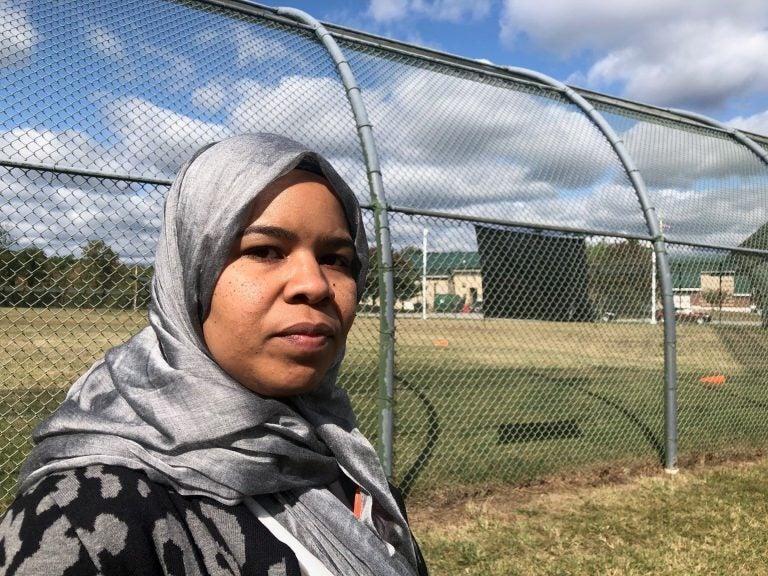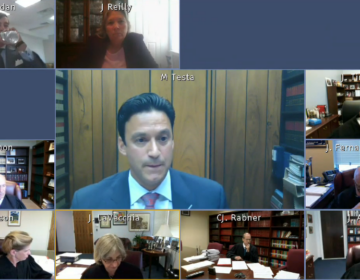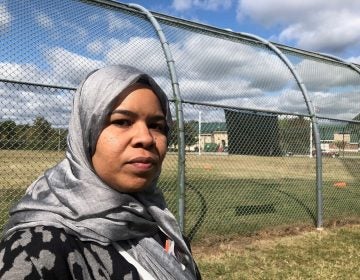Barred from wearing hijabs, former youth detention center workers sue Delaware
The three women say the state’s policy barring “hoodies, hats or headgear” at these facilities amounts to religious and gender discrimination.

Madinah Brown is one of three former youth detention counselors suing over the agency's hijab ban. (Cris Barrish/WHYY)
Three Muslim women who formerly worked at a juvenile detention center in New Castle County filed a federal discrimination lawsuit against the state of Delaware Thursday because officials barred them from wearing hijabs on the job.
Madinah Brown, Shakeya Thomas and Tia Mays all had similar experiences of religious and gender discrimination in their jobs with the state’s Department of Services of Children, Youth and their Families, according to the filing in the U.S. District Court for Delaware.
All three women claim they wore their Islamic headscarves when they were interviewed and during orientation and training for their jobs as youth rehabilitation counselors. The lawsuit alleges supervisors did not inform them that employees could not wear hijabs into the detention center near Wilmington.
The women said it was only after they started working — for several days in Brown’s case — that they were informed the facility prohibited employees from wearing “hoodies, hats or headgear,” the lawsuit says.
Attorney Gadeir Abbas called the women’s experiences “illegal and terrible” during a virtual announcement of the lawsuit Thursday on the Council on American-Islamic Relations’ YouTube and Facebook pages.
Known as CAIR, the council is representing the women along with Wilmington attorney Patrick Gallagher. Lawyers for CAIR held a news conference with Brown outside the detention center in October, detailing her situation and her complaints with the U.S. Equal Employment Opportunity Commission and the Delaware Department of Labor. Those administrative remedies have been “exhausted,’’ the lawsuit said, but the women received notice of a “right to sue.”
“These types of irrational, inexplicable policies end up, in the final analysis, reflecting the anti-Muslim sentiment that is unfortunately all too common in our country today,’’ Abbas said. “It’s unfortunate, but it seems that this Delaware state agency is not fulfilling its obligations under the federal constitution.”
DSCYF Secretary Josette Manning, who is one of seven employees named in the suit, declined to be interviewed Thursday.
Spokesperson Jeni Rini said in a written statement that the agency can’t comment on “pending litigation or personnel matters,” but is “committed to supporting diversity, inclusion and religious freedoms. The department has always valued the diverse beliefs and experiences of our staff and the clients we serve, and we are dedicated to maintaining an inclusive environment for all.”
In October, Manning said the policy exists for employees’ safety in the juvenile facility where many of the youth have been charged with violent felonies.
“In some instances, a person’s job may require them to do certain actions, such as the physical restraint of a youth, that makes wearing some religious clothing unsafe,’’ Manning said at the time.
Mays was the only plaintiff who participated in Thursday’s announcement.
She said that when orientation was ending, a supervisor “told me I wasn’t able to wear that’’ and she took that to mean her abaya, the long dress she was wearing that day. Mays said she told the boss she understood.
“She never mentioned anything about my hijab, my head covering,” Mays said.
She worked her first night wearing the hajib and experienced “no issues or concerns,” Mays said. But upon arriving the next day, Mays said she was told by a supervisor she could not enter the unit and was then shown the policy.
“I let the lady know that this wasn’t a regular head-covering. This wasn’t a hat or a scarf. It was religious,” she said.
That argument didn’t sway her superiors, Mays said, and she was given the option to work without the hijab or resign. So she resigned.
The lawsuit also said that the state rejected Brown’s proposal to wear a detachable hijab so she wouldn’t be in danger of being choked during a potential confrontation.
Brown kept reporting to work after being prohibited from working while wearing the hijab, the lawsuit said, clocking in and being sent home each day. She said one supervisor who forced her to leave called her “a terrorist.”
Beyond financial damages, the plaintiffs are seeking an injunction ordering the department “to institute a religious accommodation allowing Muslim workers to wear religious head coverings.”

Get daily updates from WHYY News!
WHYY is your source for fact-based, in-depth journalism and information. As a nonprofit organization, we rely on financial support from readers like you. Please give today.






